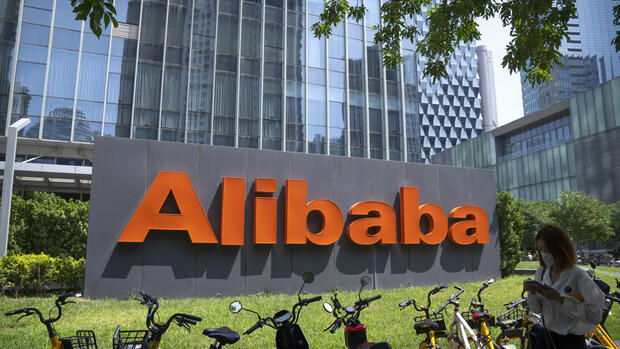The Chinese technology company is repositioning itself.
(Photo: AP)
Beijing The Chinese Internet company Alibaba is reorganizing its management team. The new head of the holding company from September will be Eddie Wu, who has previously managed the high-revenue e-commerce business. He replaces Daniel Zhang, who will focus on leading the fast-growing cloud unit and preparing it for the planned IPO.
The change in management is a consequence of the largest restructuring in the company’s history, which was announced in March. Alibaba announced at the time that it would split its business into six independently managed companies.
With the exception of the core business of online trading, which accounts for almost 70 percent of group sales, the companies should have the opportunity to go public. In addition to the cloud business, the logistics division Cainiao and the food division Freshhippo are also aiming for an IPO in the next 18 months.
With the conversion, Alibaba follows the example of Google, which carried out a similar restructuring in 2015 under the umbrella of the Alphabet holding company. The move is also likely to be a reaction to the wave of regulations in the Chinese tech sector over the past two years. This hit Alibaba hard.
The tech group, which has been spoiled by success, grew by just 1.8 percent in the past fiscal year, which ended in March. The turnover was the equivalent of 116 billion euros, the profit almost 9.7 billion euros.
Alibaba suffers from tech regulation
Alibaba was targeted by regulators in 2020. At a financial forum in Shanghai, founder Jack Ma had criticized the conservative regulation in the financial sector as a “pawn shop mentality”. Shortly thereafter, the authorities prohibited the mega IPO of the financial services subsidiary Ant, which was valued at $24.5 billion.
The fine was part of a so-called “rectification campaign” in China’s tech sector. In previous years, tech companies like Alibaba, Baidu and Tencent had grown into powerful conglomerates – largely unregulated and protected by a ban on foreign competitors.
In the past two years, however, the market power of the corporations has been severely curtailed, officially to protect customers and employees and to maintain fair competition. Unofficially, the ruling Communist Party has also tightened control over the sector and brought it into line politically.
However, the hot phase of the crackdown now seems to be over. This is probably also related to the fact that the Chinese economy has not recovered from the corona chaos as quickly as hoped.
More: Rapid growth in Chinese shopping apps has alarmed politicians
